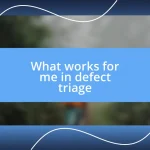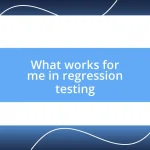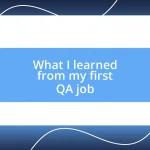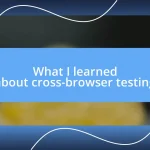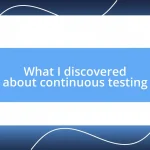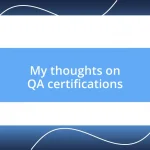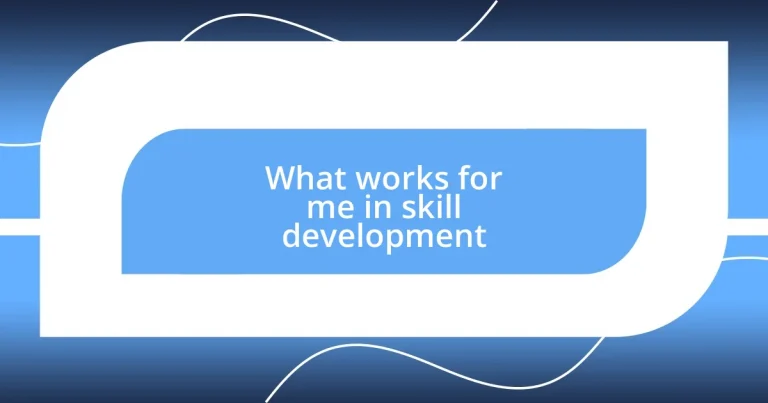Key takeaways:
- Skill development is a personal journey that involves emotional resilience, deliberate practice, and the ability to embrace challenges and feedback.
- Identifying skill gaps through self-reflection and feedback from others is crucial for targeted improvement and setting specific, measurable goals enhances progress.
- Creating a supportive learning environment fosters collaboration and emotional safety, greatly enriching the skill development experience.
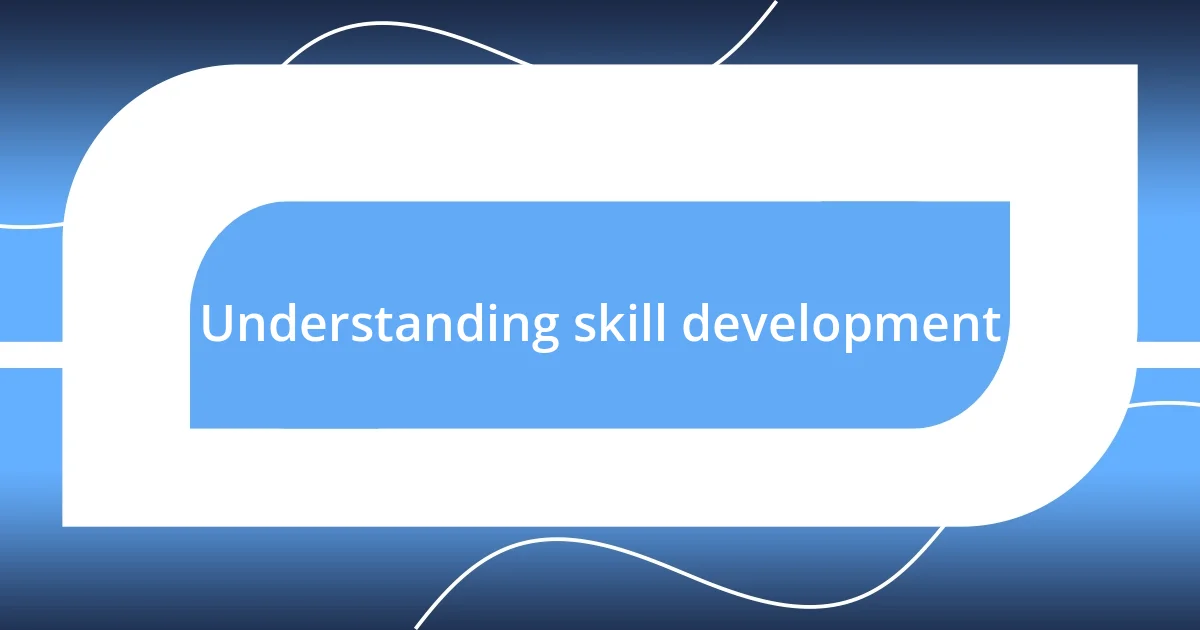
Understanding skill development
Skill development is a deeply personal journey for each individual. I often reflect on my own experiences, remembering how every new skill came with its own set of challenges and triumphs. It makes me wonder: have you ever faced a steep learning curve that seemed daunting at first? Each challenge is an opportunity in disguise, nudging us to step out of our comfort zones.
Diving into skill development requires deliberate practice and a clear understanding of what you want to achieve. I recall when I decided to learn guitar; it wasn’t just about hitting the right notes. It was about embracing the frustration of sore fingers and the thrill of finally playing a song I loved. Isn’t it fascinating how a little perseverance can turn struggles into significant milestones?
Emotional resilience plays a crucial role in skill development. I still feel that rush of excitement every time I master something new, but there have been plenty of moments when doubt crept in. Have you ever felt like giving up? I certainly have. But those moments only strengthened my resolve. Understanding that persistence pays off transforms the entire learning experience into something truly rewarding.
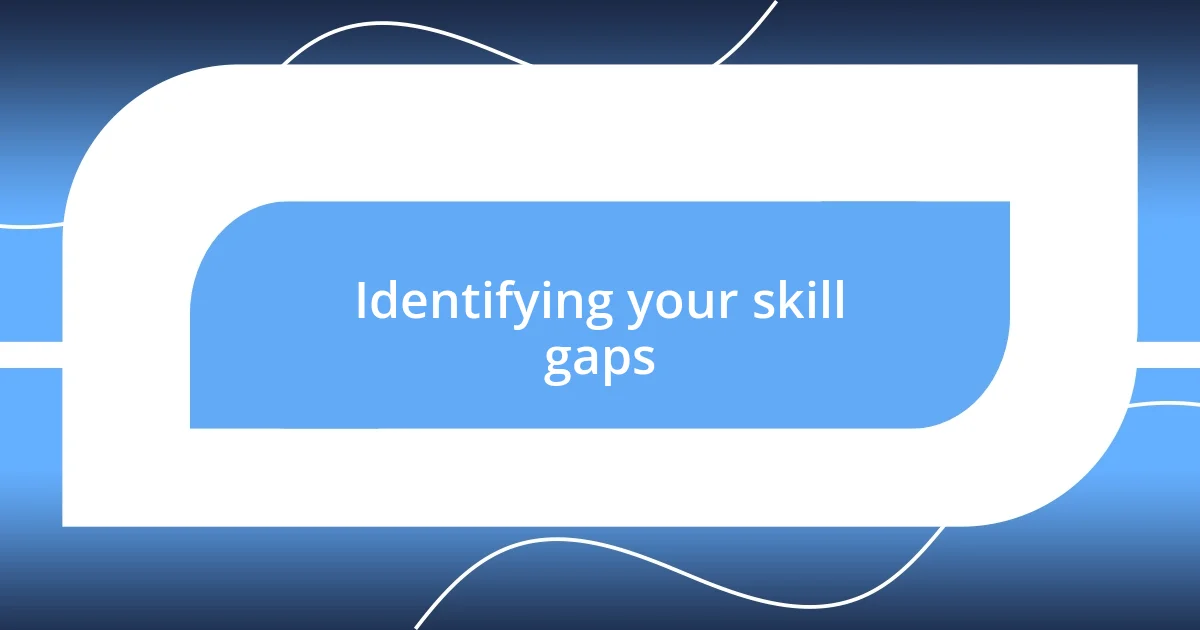
Identifying your skill gaps
Identifying your skill gaps can often feel like trying to find your way in the dark. I remember my first job after college; I thought I was well-prepared, but I quickly realized I lacked key skills in project management. It’s crucial to take a step back and assess what you’re good at versus what you need to work on. Have you ever had that moment of clarity when you recognized an area that was holding you back?
Another effective approach is to seek feedback from colleagues or mentors. I once asked a coworker for constructive criticism on a presentation I was leading. The insights they provided were eye-opening and revealed gaps I hadn’t even considered. Engaging in these conversations can be uncomfortable, but it’s often the most enlightening way to discover where you stand.
To deepen your understanding of your skill gaps, try setting specific goals. When I decided to improve my writing skills, I set a target of publishing one article a week. Tracking my progress allowed me to see which areas needed more attention, such as storytelling and grammar. This intentional focus made a significant difference in my overall development.
| Skill Identification Method | Personal Experience |
|---|---|
| Self-reflection | Realizing project management skills were lacking after college. |
| Feedback from Others | Learning about presentation weaknesses from a colleague’s critique. |
| Goal Setting | Improving writing by committing to publish weekly articles. |
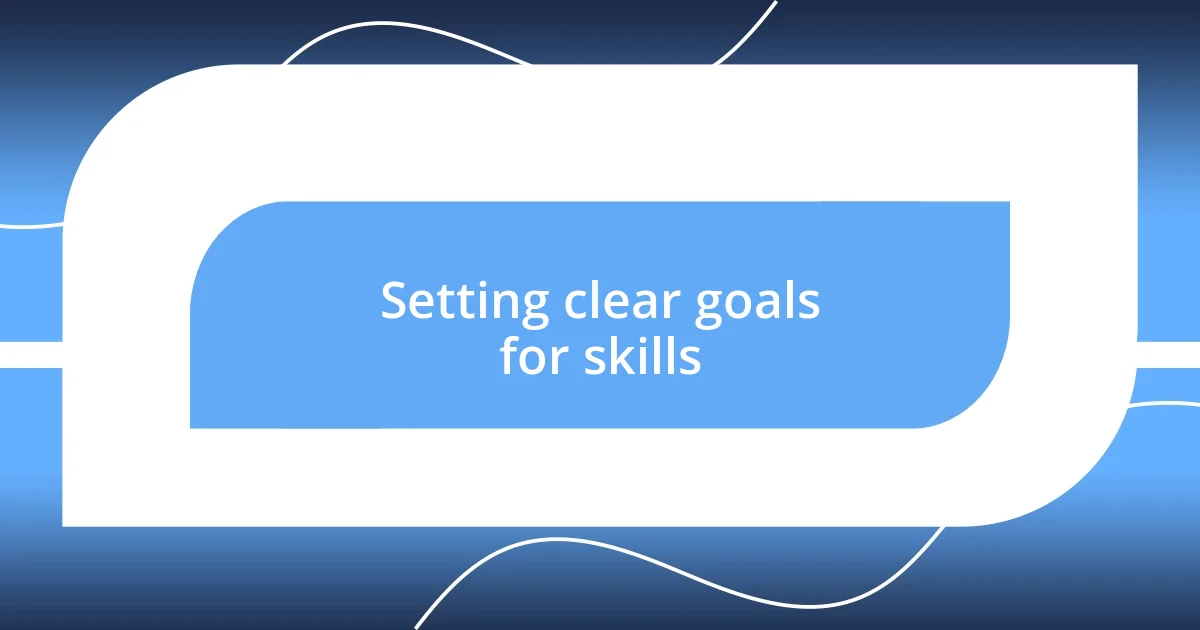
Setting clear goals for skills
Setting clear goals is like drawing a road map for your skill development journey. I often find myself more motivated when I know exactly what I want to achieve. For instance, when I dived into learning graphic design, I set a goal to create a specific project—like a promotional poster—within three months. This tangible objective not only focused my efforts but also made the learning process exciting. There’s a certain satisfaction that comes from ticking off goals on a list, don’t you think?
To effectively set goals for skill development, consider these key strategies:
- Be Specific: Clearly outline what skills you want to develop. Instead of saying “I want to get better at coding,” specify “I want to learn Python to build a personal website.”
- Set Measurable Milestones: Break down your larger goal into smaller, achievable steps. For example, aim to complete one coding tutorial each week.
- Establish a Timeline: Create deadlines to keep yourself accountable, such as finishing a course by the end of the month.
- Reflect Regularly: Take time to review your progress and adjust your goals if necessary. I’ve learned that flexibility can be just as important as discipline.
By crafting a detailed and personalized plan, you empower yourself to navigate challenges effectively, transforming the skill development process into a fulfilling adventure.
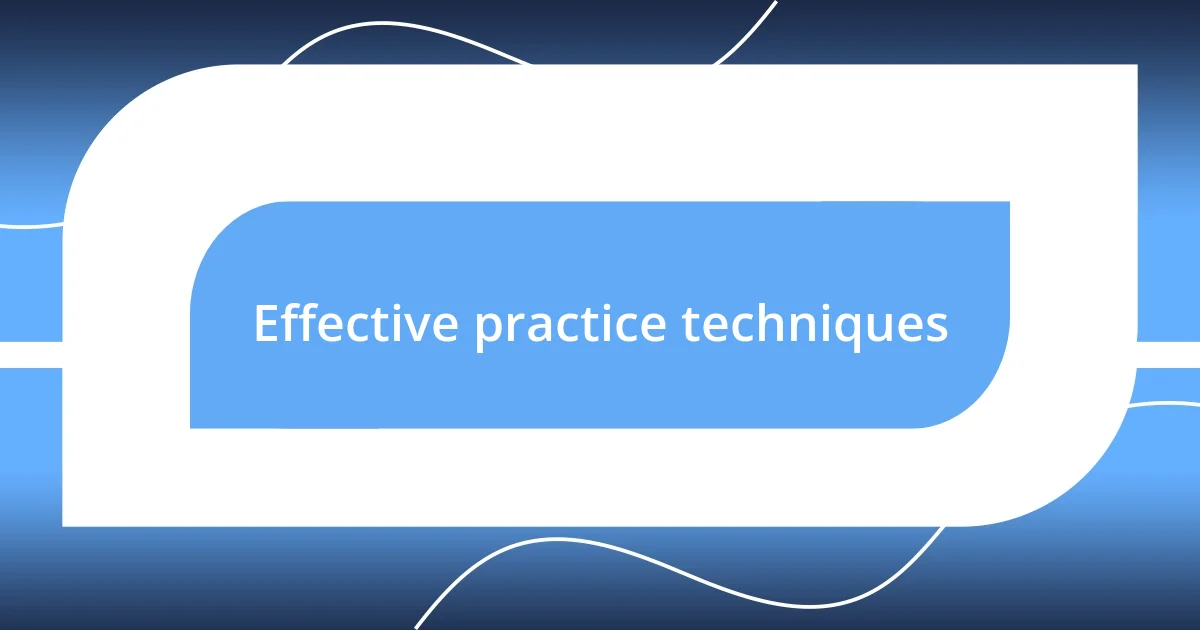
Effective practice techniques
Effective practice techniques are key to mastering any skill. One method that has genuinely transformed my approach is the concept of deliberate practice. Instead of mindless repetition, I focus on targeted exercises designed to stretch my abilities. For example, when I was learning to play guitar, I dedicated my practice sessions to mastering tough chord transitions rather than just strumming through familiar songs. This focused approach made every practice feel purposeful and productive.
Another technique I’ve found incredibly useful is breaking tasks into smaller components. I remember when I wanted to improve my public speaking skills; I started by recording myself giving short messages. Watching those recordings was often cringe-worthy, but it provided profound insights into my pacing and body language. Have you ever analyzed your performance like this? Embracing that discomfort led to significant growth.
Lastly, incorporating a variety of practice methods can keep the process fresh and engaging. When I decided to enhance my digital marketing knowledge, I combined online courses with real-world applications by volunteering for social media management at a local nonprofit. This blend not only solidified my theoretical understanding but also gave me practical experience. Mixing up techniques helps maintain enthusiasm and can dramatically enhance your learning experience.
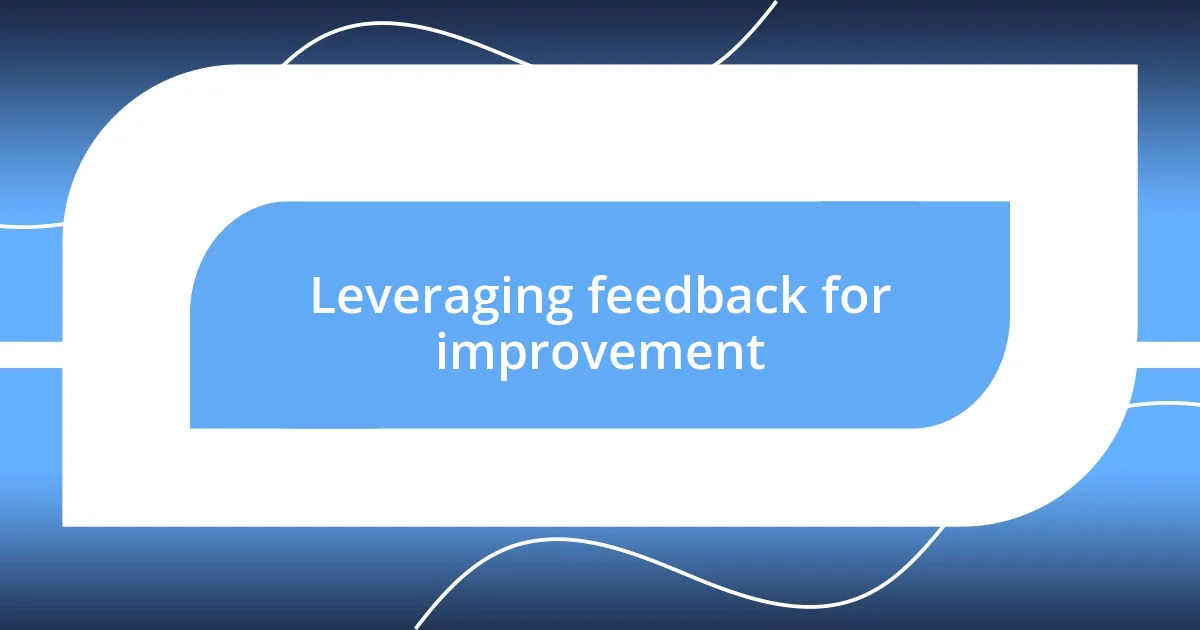
Leveraging feedback for improvement
Feedback is one of the most powerful tools for improvement, especially in skill development. After I started seeking constructive criticism during my learning journeys, I noticed a significant difference in my progress. For instance, when I decided to improve my writing, I shared my drafts with peers and mentors who offered insights I had never considered. It’s eye-opening how other perspectives can shine a light on blind spots, don’t you think?
Engaging with feedback requires an open mindset. I’ve often found it challenging to accept criticism, but I learned that viewing it as a learning opportunity makes all the difference. There was a moment when an editor pointed out repetitive phrasing in my articles. Initially, I felt defensive, but after reflecting on their comments, I focused on diversifying my vocabulary, which ultimately enhanced my writing style. Embracing feedback not only improves my skills but also cultivates resilience.
In my experience, actionable feedback leads to tangible improvements. I recall taking a painting class where my instructor suggested I experiment with color mixing instead of relying on store-bought paints. At first, it felt risky, but the results were exhilarating! Missing out on such suggestions would have stunted my creativity. Have you ever pushed your boundaries based on feedback? It’s those moments of experimentation that truly nurture growth and elevate our skill sets.
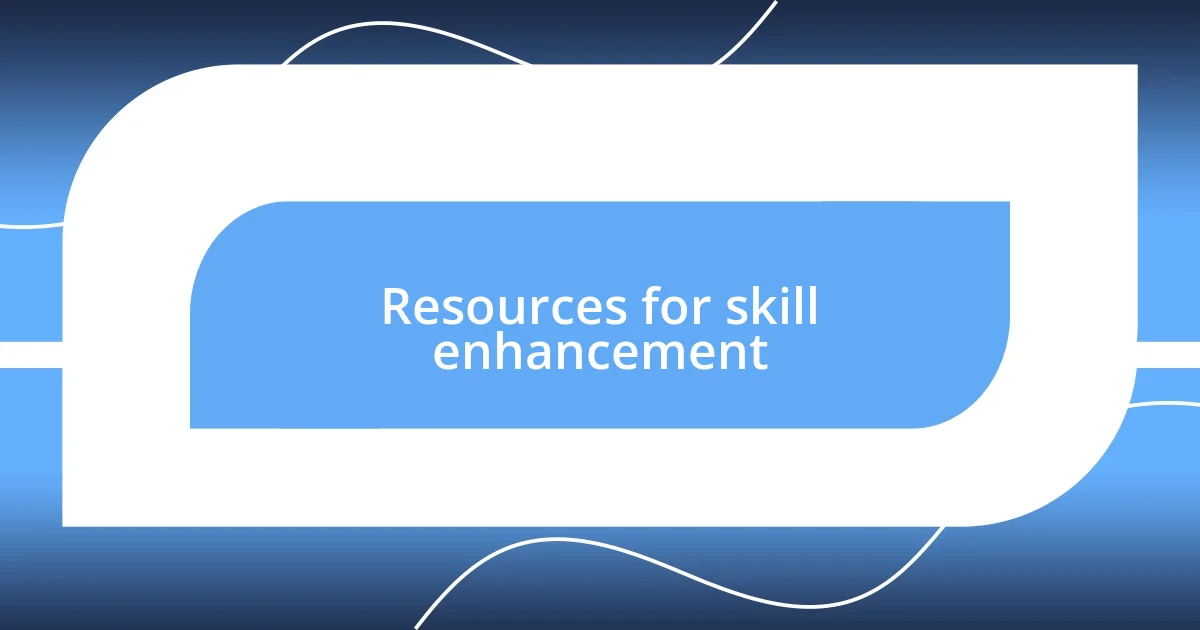
Resources for skill enhancement
When it comes to enhancing skills, I’ve found that tapping into online resources is invaluable. Websites like Skillshare and Coursera provided me with an endless well of courses taught by industry professionals. I remember diving into a graphic design course during a particularly slow weekend. The ability to learn at my own pace meant that I could rewind and replay lessons, really absorbing the material instead of rushing through it. Isn’t it empowering to learn something new right from the comfort of your own home?
Books and audiobooks are also crucial resources in my skill development toolkit. I still recall picking up a book on negotiation; it completely reshaped how I approached discussions. Hearing the author’s passion for the subject made it come alive for me, and I found myself eagerly applying techniques in real conversations. Have you ever noticed how a well-written book can ignite your curiosity and drive? For me, it’s like having a mentor on the page, guiding me through my learning journey.
Lastly, community events such as workshops and meetups have been incredibly beneficial. I once attended a local coding meetup where I not only learned new coding techniques but also connected with others who shared my interests. The energy of collaborating with peers is unmatched; their enthusiasm can inspire you to push your limits. Have you ever felt the buzz of being part of a learning community? That collective motivation can be a game-changer in your skill enhancement journey.
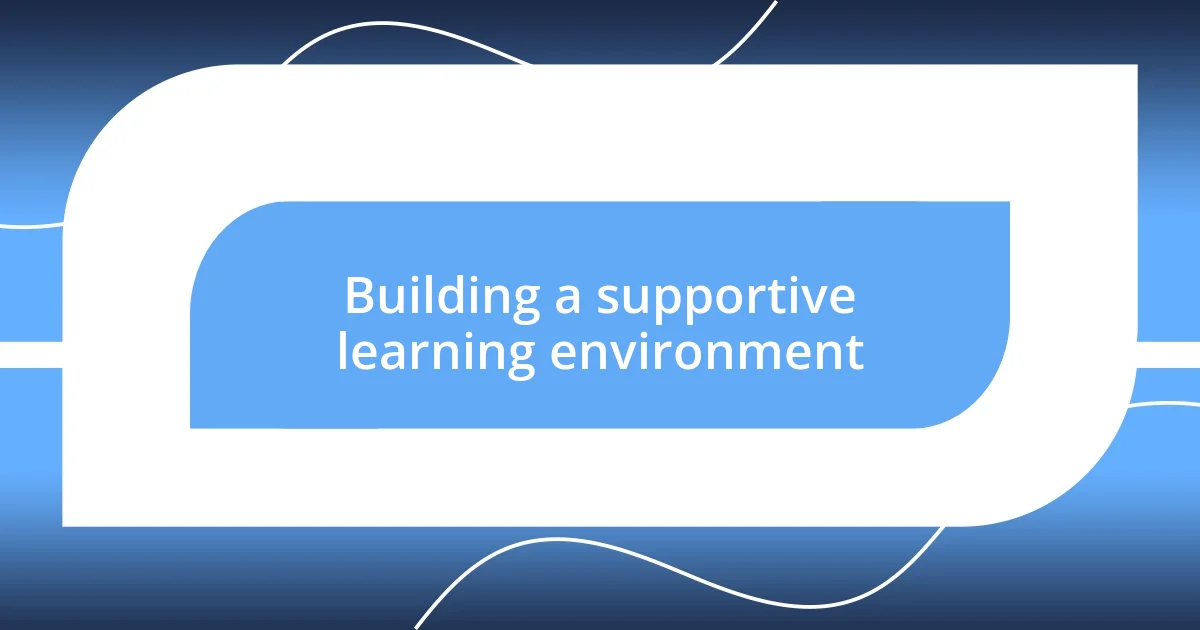
Building a supportive learning environment
Creating a supportive learning environment is something I’ve truly come to appreciate over the years. I remember a group project during my college days where the atmosphere was so positive that it made tackling challenging assignments feel less daunting. When we encouraged each other and celebrated even small victories, I felt more motivated to contribute. Isn’t it fascinating how our surroundings can shape our learning experience?
One aspect that stands out to me is the importance of emotional safety in a learning space. I once attended a workshop where the facilitator emphasized that there are no silly questions. This simple statement created a ripple effect; many of us opened up and shared our uncertainties. I felt that weight lift off my shoulders, allowing me to engage without fear of judgment. Have you ever realized how transformative it can be when you feel free to express yourself?
Furthermore, I believe actively encouraging collaboration fosters a sense of belonging. In my experience, co-learning through shared experiences tightens bonds and solidifies knowledge. During a writing retreat, several of us brainstormed ideas together, bouncing thoughts off one another. It was remarkable to see how our collective creativity flourished. Isn’t it incredible how much more we can achieve when we share our skills and insights?


